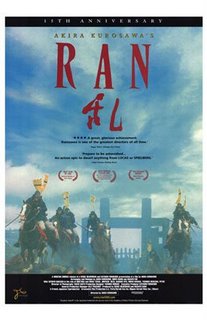Ran
For the past year or so, I have been writing film and TV reviews at DVDFanatic.com. Here are synopsis' and links to those reviews.

It’s hardly an exaggeration to say that fans of Akira Kurosawa's late-life masterpiece, Ran, have suffered through the indignity of several incredibly sub-par DVD releases of this phenomenal film, waiting in frustration for an inspired distributor to take the reins of the project and do it justice. I know, because I was one.
The wait, my friends, is over.
While attending the Telluride Film Festival this year, I was thoroughly delighted to see that the festival’s special medallion would be awarded to the Criterion Collection and its sister company, Janus Films. Pioneers and continuing trailblazers in the arena of DVD production, Criterion is the undisputed leader of top-of-the-line art-house, foreign and popular DVD releases of devastatingly powerful films offered with optimum picture quality, an avalanche of literate extras, and stylish and intelligent packaging. (I still think the revolting Armageddon was snuck in under their noses by the building’s night custodian!) With their latest Kurosawa release, Ran, Criterion has completely remastered and refurbished 14 of the late master’s works. And like their past additions, this is a DVD for the ages.
A reimagining of Shakespeare’s "King Lear" set as a historical epic in sixteenth-century Japan, the majestic Ran is a profound examination of the folly of war and the disintegration of one family under the oppressive weight of betrayal, greed, and an unquenchable thirst for power.
When Lord Hidetora proclaims his abdication of the throne and divides his land equally between his three sons, chaos (which is translated “ran” in Japanese) shatters the once-great kingdom. One son is banished and the other two, possessed of the lust and fury that their father surely once had in order to attain such a great kingdom in the first place, will, like dogs, tear at each other for the spoils until there is nothing left but corpses and husks of once-great feudal castles. As the sins of the king’s pride and neglect coalesce into a maelstrom, he will find himself peripheralized, wandering the margins. Uniquely, the action doesn't center on the old king, but on a primal, fearful energy through which he roams and by which he is eventually infused with madness.
Ran is Kurosawa at the apex of cinematic artistry and is perhaps his most fully-realized epic. At once lyrical and grandiose, simple and complex, Ran is awash with beautiful imagery, a haunting score and masterful performances. Kurosawa refined everything he learned about battle scenes in his earlier samurai epics and in perhaps the most grandiose battle scene every filmed, he reveals the devastating consequences and the contradictory beauty of conflict. Ran is a masterpiece from its peaceful overture to its bloody Shakespearean heart to its final, sorrowful denouement.
To read the full review, click here.

It’s hardly an exaggeration to say that fans of Akira Kurosawa's late-life masterpiece, Ran, have suffered through the indignity of several incredibly sub-par DVD releases of this phenomenal film, waiting in frustration for an inspired distributor to take the reins of the project and do it justice. I know, because I was one.
The wait, my friends, is over.
While attending the Telluride Film Festival this year, I was thoroughly delighted to see that the festival’s special medallion would be awarded to the Criterion Collection and its sister company, Janus Films. Pioneers and continuing trailblazers in the arena of DVD production, Criterion is the undisputed leader of top-of-the-line art-house, foreign and popular DVD releases of devastatingly powerful films offered with optimum picture quality, an avalanche of literate extras, and stylish and intelligent packaging. (I still think the revolting Armageddon was snuck in under their noses by the building’s night custodian!) With their latest Kurosawa release, Ran, Criterion has completely remastered and refurbished 14 of the late master’s works. And like their past additions, this is a DVD for the ages.
A reimagining of Shakespeare’s "King Lear" set as a historical epic in sixteenth-century Japan, the majestic Ran is a profound examination of the folly of war and the disintegration of one family under the oppressive weight of betrayal, greed, and an unquenchable thirst for power.
When Lord Hidetora proclaims his abdication of the throne and divides his land equally between his three sons, chaos (which is translated “ran” in Japanese) shatters the once-great kingdom. One son is banished and the other two, possessed of the lust and fury that their father surely once had in order to attain such a great kingdom in the first place, will, like dogs, tear at each other for the spoils until there is nothing left but corpses and husks of once-great feudal castles. As the sins of the king’s pride and neglect coalesce into a maelstrom, he will find himself peripheralized, wandering the margins. Uniquely, the action doesn't center on the old king, but on a primal, fearful energy through which he roams and by which he is eventually infused with madness.
Ran is Kurosawa at the apex of cinematic artistry and is perhaps his most fully-realized epic. At once lyrical and grandiose, simple and complex, Ran is awash with beautiful imagery, a haunting score and masterful performances. Kurosawa refined everything he learned about battle scenes in his earlier samurai epics and in perhaps the most grandiose battle scene every filmed, he reveals the devastating consequences and the contradictory beauty of conflict. Ran is a masterpiece from its peaceful overture to its bloody Shakespearean heart to its final, sorrowful denouement.
To read the full review, click here.


0 Comments:
Post a Comment
<< Home